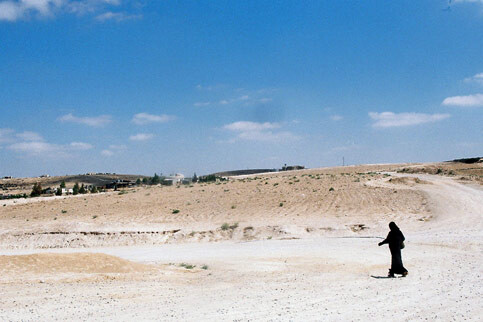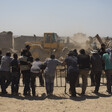The Electronic Intifada 20 August 2007

A woman returns home after a visit to the local medical clinic. In some cases, the clinics are located at great distances from residential areas, making access difficult. (Shabtai Gold/IRIN)
BEERSHEBA, 20 August 2007 (IRIN) - A new legal petition to Israel’s High Court demands the state connect 11 primary health care clinics in the unrecognized Bedouin villages in the Negev desert to the main power grid in order to provide better health services.
The clinics, which were established as a result of previous petitions, use generators, but only during opening hours. Afterwards, the electricity shuts off.
This, attorney Sonia Boulos said, “violates the right to health and equality to which residents of the unrecognized villages in the Negev are entitled.”
Boulos, from the Association for Civil Rights in Israel (ACRI), filed the petition along with the Regional Council for the Unrecognized Bedouin Villages (RCUV) and the Physicians for Human Rights-Israel (PHRI), both local non-governmental organizations.
The villages themselves, which are unrecognized as the state says their presence on the land is “illegal,” are not connected to the grid.
“The poorer people in my village bring medicines to my house for refrigeration because we have solar panels and a generator,” said Khalil al-Amour from al-Sera, where only a few families are able to afford constant electricity.
This, he said, cannot be a real solution to the village’s needs and in other villages even this option does not exist.
The generators break down leaving the clinics without power for several days and refrigeration remains the main problem. Many medications and vaccines requiring cool temperatures are simply not available because they would go bad.
In the summer heat other drugs are affected, losing their effectiveness or even going toxic, the petitioners alleged, backed by medical expert opinions submitted to the court.
“Most of these types of medicines are distributed elsewhere,” a nurse at one clinic told IRIN, adding that this involved travelling.
Difficult journey
For some of the 80,000 residents of the unrecognized Bedouin villages, traveling to get medical attention, which is not simple, is the only way to reach a clinic.
Ahmed al-Nassassrah described how women in his village, where not everyone has a car and the men tend to leave early in the morning to go to work, try and go to the closest clinic as they do not have one of their own.
“Let’s say the child is sick. The mother and child must walk to the main road where they then have to wait for a ride. Hitchhike. Then she has to get off at the junction where she waits for a bus to take her to the town [with a clinic]. Then she has to walk about three kilometers to the clinic,” al-Nassassrah said.
“And then she has to go all the way back. Sometimes with one or two sick children,” he added.
“And, in our culture, it is still not entirely OK for women to hitchhike.”
But, even in villages with the 11 health clinics, access is not necessarily easier.
In Wadi al-Naam village, for example, the state-run health clinic is located about two kilometers from the residential section, accessible via a steep dirt road.
“It’s easier to travel to the city than to reach the clinic here,” said Ibrahim, a resident of Wadi al-Naam who traveled over 10 kilometers to another clinic rather than try and access the one in his own village.
Discrimination?
Inside some of the 11 clinics there are other problems. Although the clinics serve only the Arab-speaking Bedouin population, nearly all the signs are in Hebrew, and in at least one clinic the receptionist was an Israeli who does not speak Arabic.
“Most of the women in the unrecognized villages speak very limited Hebrew and read none at all,” said one observer, wondering why the state did not hang up signs in Arabic, as it did in other places in the country.
“And if someone has to call the clinic for information, and the person answering the phone doesn’t speak Arabic, how is anything supposed to move forward?”
“We want access to health services for all residents of the villages,” said Atwa Abu Friah, general director of the RCUV.
“The nearby kibbutzes get better care than we do, so it is not a matter of rural versus urban health care. We are discriminated against,” he charged.
“We have to travel all the way to Beersheba to get health services the Jewish towns get within their own community,” he said, referring to the main city in the Negev.
State’s response
Israel’s Ministry of Health has admitted — regarding the unrecognized villages — that vaccines requiring refrigeration are not kept in the 11 clinics there when the generators are off.
It said: “A petition to the High Court was filed on this matter and the Ministry of Health’s response to these questions will be answered within the framework of the response to the petition to the High Court.”
This item comes to you via IRIN, a UN humanitarian news and information service, but may not necessarily reflect the views of the United Nations or its agencies. All IRIN material may be reposted or reprinted free-of-charge; refer to the copyright page for conditions of use. IRIN is a project of the UN Office for the Coordination of Humanitarian Affairs.
Related Links

